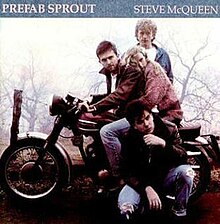Steve McQueen (album)
| Steve McQueen | ||||
|---|---|---|---|---|
 |
||||
| Studio album by Prefab Sprout | ||||
| Released | June 1985 | |||
| Recorded | 1984–85 | |||
| Studio | Nomis Studios in West London | |||
| Genre | Sophisti-pop, post-punk, new wave, indie pop | |||
| Length | 45:18 | |||
| Label | Kitchenware | |||
| Producer | Thomas Dolby | |||
| Prefab Sprout chronology | ||||
|
||||
| Singles from Steve McQueen | ||||
|
||||
| Professional ratings | |
|---|---|
| Review scores | |
| Source | Rating |
| AllMusic | |
| Encyclopedia of Popular Music | |
| Hot Press | 11/12 |
| Mojo | |
| Pitchfork Media | 8.6/10 |
| Q | |
| Record Collector | |
| Spin | |
| Uncut | |
| The Village Voice | B+ |
Steve McQueen is the second studio album by English pop band Prefab Sprout, released in June 1985. The album peaked at number 21 on the UK Albums Chart and number 180 on the US Billboard 200. The album was released in the United States as Two Wheels Good due to a legal conflict with the estate of American actor Steve McQueen.
The cover of the album is a reference to Steve McQueen's lifelong passion for Triumph motorcycles and the 1963 film The Great Escape, starring McQueen and featuring prominent motorcycle chase scenes (with stunts performed by himself on a Triumph motorcycle).
On 2 April 2007 it was reissued as a "legacy edition" double CD, featuring a remastered version of the original album and a bonus disc featuring acoustic versions of the songs recorded by the band's frontman Paddy McAloon in 2006.
On an episode of the BBC Radio 1 program Roundtable, noted musician and producer Thomas Dolby, a panelist on the program, spoke favorably of Prefab Sprout's "Don't Sing", a track from their 1984 Swoon. The band subsequently contacted Dolby, who met with their frontman and primary lyricist Paddy McAloon in the latter's County Durham home. McAloon presented Dolby with a number of songs he had written, "probably 40 or 50" by Dolby's estimate, some written as far back as 10–12 years prior. Dolby then picked his favorites and asked McAloon to make demo recordings of them; these recordings served as the basis for Dolby's initial process of planning the album's recording.
In the autumn of 1984, Dolby and Prefab Sprout began working on the album's songs in rehearsals at Nomis Studios in West London; after these sessions had commenced, they moved to Marcus Studios for proper recording. The sessions were of a mutually-amicable atmosphere, with the band being respectful of Dolby's edge over them in recording and musical experience and Dolby himself keeping into account the band's wishes, knowing that McAloon "wouldn't want to be diluted" by his additions to the album. Subsequent mixing was carried out at Farmyard Studios in Buckinghamshire.
...
Wikipedia
